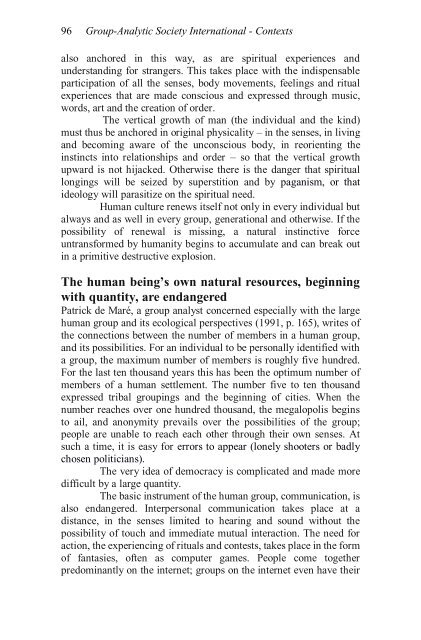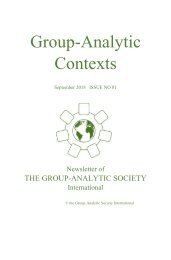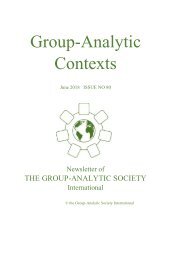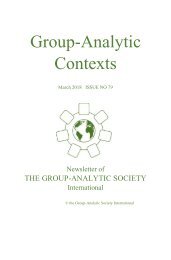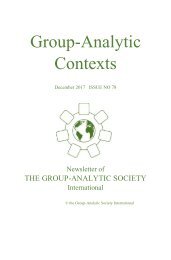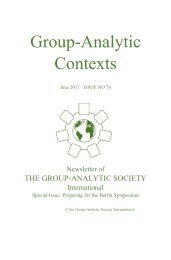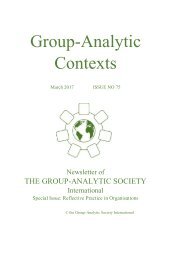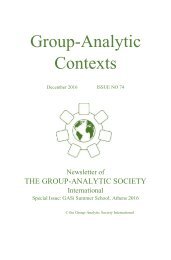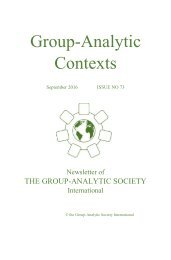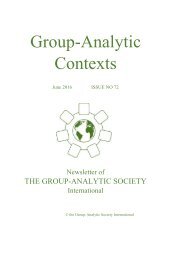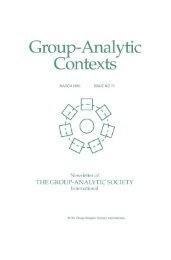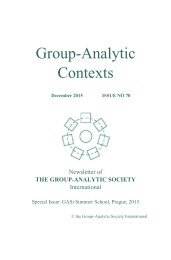Group Analytic Contexts, Issue 77, September 2017
Newsletter of the Group Analytic Society International
Newsletter of the Group Analytic Society International
Create successful ePaper yourself
Turn your PDF publications into a flip-book with our unique Google optimized e-Paper software.
96 <strong>Group</strong>-<strong>Analytic</strong> Society International - <strong>Contexts</strong><br />
also anchored in this way, as are spiritual experiences and<br />
understanding for strangers. This takes place with the indispensable<br />
participation of all the senses, body movements, feelings and ritual<br />
experiences that are made conscious and expressed through music,<br />
words, art and the creation of order.<br />
The vertical growth of man (the individual and the kind)<br />
must thus be anchored in original physicality – in the senses, in living<br />
and becoming aware of the unconscious body, in reorienting the<br />
instincts into relationships and order – so that the vertical growth<br />
upward is not hijacked. Otherwise there is the danger that spiritual<br />
longings will be seized by superstition and by paganism, or that<br />
ideology will parasitize on the spiritual need.<br />
Human culture renews itself not only in every individual but<br />
always and as well in every group, generational and otherwise. If the<br />
possibility of renewal is missing, a natural instinctive force<br />
untransformed by humanity begins to accumulate and can break out<br />
in a primitive destructive explosion.<br />
The human being’s own natural resources, beginning<br />
with quantity, are endangered<br />
Patrick de Maré, a group analyst concerned especially with the large<br />
human group and its ecological perspectives (1991, p. 165), writes of<br />
the connections between the number of members in a human group,<br />
and its possibilities. For an individual to be personally identified with<br />
a group, the maximum number of members is roughly five hundred.<br />
For the last ten thousand years this has been the optimum number of<br />
members of a human settlement. The number five to ten thousand<br />
expressed tribal groupings and the beginning of cities. When the<br />
number reaches over one hundred thousand, the megalopolis begins<br />
to ail, and anonymity prevails over the possibilities of the group;<br />
people are unable to reach each other through their own senses. At<br />
such a time, it is easy for errors to appear (lonely shooters or badly<br />
chosen politicians).<br />
The very idea of democracy is complicated and made more<br />
difficult by a large quantity.<br />
The basic instrument of the human group, communication, is<br />
also endangered. Interpersonal communication takes place at a<br />
distance, in the senses limited to hearing and sound without the<br />
possibility of touch and immediate mutual interaction. The need for<br />
action, the experiencing of rituals and contests, takes place in the form<br />
of fantasies, often as computer games. People come together<br />
predominantly on the internet; groups on the internet even have their


